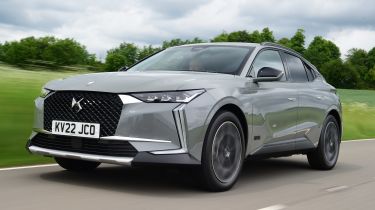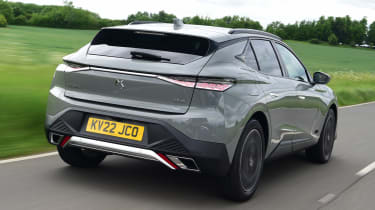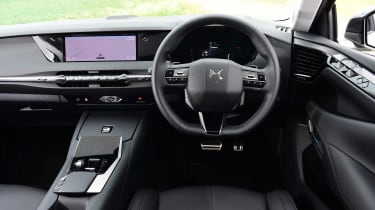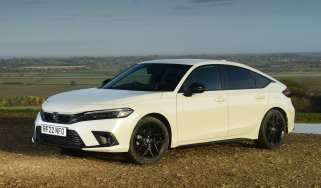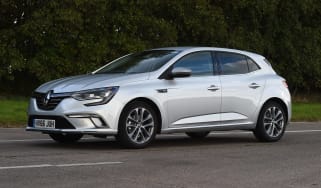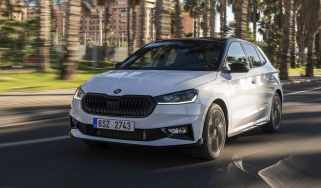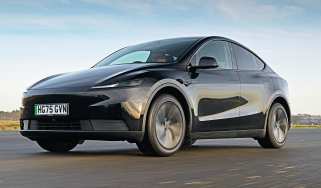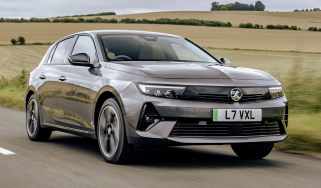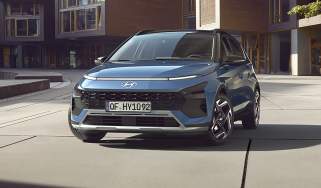New DS 4 E-Tense 2022 review
Is the new DS 4 the best car yet from the French brand? We hit the road in the new plug-in hybrid E-Tense model to find out…

Verdict
It’s understandable why DS has big aspirations for this new DS 4. It feels distinct in a class of closely aligned rivals and boasts quality, comfort and tech to back it up. However, it’s the comfort that really stands out. Helped by its plug-in hybrid powertrain it’s relatively refined and relaxing, and fits with the brand’s ethos. It’s the most convincing DS model yet.
It’s fair to say that since spreading its wings as a standalone brand after its carve-out from Stellantis sibling Citroen, DS hasn’t set the world alight when it comes to its products or sales performance. But the DS 4 is set to change that completely, according to the French brand.
This new compact crossover is a key driver in DS doubling its market share in 2022, something its on track to achieve already given its order bank; this is where the push comes to challenge premium rivals such as Audi, BMW and Mercedes. So, is it marketing spiel or does the DS 4 genuinely have what it takes?
There is some of the former involved here, but there’s plenty of the latter too. Based on the Stellantis EMP2 platform, it’s an E-Tense 225 plug-in hybrid in high-spec Cross Rivoli trim we’re testing, which at £42,200 certainly has the premium price tag.
Used - available now

2024 Vauxhall
Crossland
14,436 milesAutomaticPetrol1.2L
Cash £12,995
2021 Lexus
NX Hybrid
40,995 milesAutomaticPetrol2.5L
Cash £24,995
2023 Mercedes
A-Class
11,493 milesAutomaticPetrol1.3L
Cash £22,495
2022 Renault
Megane E-Tech Electric
23,416 milesAutomaticElectric
Cash £17,100Step inside and things aren’t immediately any more appealing, as the interior design still looks and feels disjointed, with some odd ergonomic elements, such as the window switches placed high-up on the narrow door top, and a mix of physical and touch-sensitive controls – arranged in a narrow strip on the dash, the latter aren’t the most elegant solution.
There’s also a mish mash of lines, textures, and materials when it comes to the design and layout, but at least the materials used do feel relatively high quality.
Thankfully, things take a turn for the better once you get underway, as the powertrain’s strong electrified element means performance is relatively good.
A 12.4kWh battery feeds a 108bhp electric motor, which does the majority of the work at lower speed with a full charge. DS claims it will be able to take you up to 38.5 miles, while the battery will take one hour and 55 minutes to charge using a 7kW home wallbox supply, or seven hours and five minutes if you top-up using a three-pin plug.
There’s an unusual whine from the electric motor that carries through the bulkhead though, and while it’s relatively faint it’s still audible, and it just takes the edge of the powertrain’s refinement at low speed.
Ask for more performance and the 178bhp 1.6-litre turbocharged four-cylinder petrol engine joins in, with both sources delivering a combined 222bhp and 360Nm of torque. It’s good enough for a 0-62mph time of 7.7 seconds, but drive the DS 4 hard to this level and refinement takes a dip further still, as the engine sounds coarse and its note could be better suppressed.
It’s best to keep try and keep engine revs low in Hybrid mode, which the EAT8 eight-speed automatic transmission does a relatively good job of, offering smooth but unhurried shifts. It's flaws in this respect are also more obvious the more performance you ask for.
Sticking true to DS’s roots with a focus on comfort, the DS 4’s ride is impressively smooth in the eponymously titled driving mode and arguably the best application yet we’ve seen from the EMP2 platform.
A multi-link rear axle on this model definitely helps the feeling of fluidity, and being raised up from the road slightly (the Cross pack actually only adds exterior badging, black roof rails, and some more protective exterior trim) means the DS Active Scan suspension has enough travel to work well.
A camera scans the road ahead to pick up lumps and bumps, adjusting the dampers’ set-up accordingly to cope. It mostly works, delivering a forgiving motion to the suspension’s damping over all but the worst surfaces at higher speeds, even on our model’s large 19-inch wheels.
Body control is on the looser side compared with conventional premium German hatchbacks, but this gives the DS 4 an identity, even if the trade-off is handling that isn’t quite as sharp as the competition. We’re not sure this ultimately matters all that much however, as the DS 4 offers enough composure.
We’re less convinced about the infotainment system though, as while the 10-inch touchscreen’s graphics are bright and clear, the DS skin still makes navigating some menus and selecting some functions confusing. The DS Smart Touch pad on the transmission tunnel – used for selecting pre-set shortcut options that includes anything from your home destination, favourite radio station, a most called number or even heated seat controls – is useful too, although the seven-inch digital dash could offer more configuration.
You get lots of kit for the cash. The standard head-up display is laid out simply and easy to read, while the main system features built-in nav, Apple CarPlay and Android Auto connectivity, plus DS’s Iris voice assistant.
Black leather upholstery is included on E-Tense Cross Rivoli models alongside matrix LED headlights with high beam assist and a ‘Dynamic Bending’ cornering function, all-round parking sensors and a reversing camera, AEB and semi-autonomous adaptive cruise control with lane-keep assist, and rear cross traffic alert.
Packaging a battery and a fuel tank means boot space drops to 390 litres in the E-Tense, down 40 litres on ICE DS 4 models, and there’s also a pronounced loading lip and a relatively small tailgate, so the opening isn’t that wide.
Passenger space is also average in the rear; headroom is tighter than legroom, as the raised-up seating position does help create a little more space to the front seatbacks.
If you’re a company car driver it’s worth bearing in mind CO2 emissions of 29g/km (DS claims up to 232mpg), putting it in the 11 per cent BiK band – but then there are plug-in hybrid rivals out there that offer similar efficiency.
| Model: | DS 4 E-Tense 225 Cross Rivoli |
| Price: | £42,200 |
| Engine: | 1.6-litre 4cyl turbo petrol + e-motor |
| Power/torque: | 222bhp/360Nm |
| Transmission: | Eight-speed automatic, front-wheel drive |
| 0-62mph: | 7.7 seconds |
| Top speed: | 145mph |
| Economy/CO2: | 232mpg/29g/km |
| On sale: | Now |

